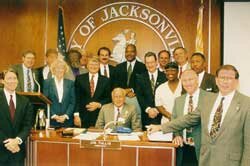Jacksonville Council Member Compares Military Payday Advance Cap to His Legislation
Those familiar with the interest rate cap Congress placed on military payday loans this week may also be familiar with the bill it resembles.
“I think it’s fair to say the tide is clearly turning against the exorbitant interest rates and the predatory lending practices that have occurred in the past,” City Council member Kevin Hyde, who introduced first-of-its-kind legislation to cap local, short-term loan interest rates at 36 percent last year, said to the Jacksonville Daily Record. “Congress, in some sense, validated what we did.”
The bill Hyde introduced was originally targeted at military payday cash loan lenders. Hyde - who is also an attorney with Foley & Lardner - said studies from the U.S. Department of Defense initially inspired the legislation, so Congress wasn’t solely taking its cues from Jacksonville.
The DOD report ranked the prevalence of payday loan providing in an area as its eighth top concern for deciding which military bases to close. Payday lenders often target military members because their paychecks are small enough to keep them in need, but steady enough to provide regular payments, according to Lynn Drysdale, an attorney with Jacksonville Area Legal Aid.
She specializes in predatory lending cases and testified for the congressional panel on military cash advance companies a few weeks ago.
“My purpose was to come and say, ‘I represent sailors and service members. This is not some (meaningless) report, I’m telling you what I’ve seen,’” said Drysdale. “I was there to provide what actually happens on the street.”
Drysdale said she’s seen predatory payday lenders charge 390 to 900 percent interest rates for their loans. Payday lenders often require direct deposit banking information to pay back the loans – causing many borrowers to take on more personal loans to ensure their payments don’t bounce and incur more fees.
“(Another) key factor is members of the military are governed by the uniform code of military justice,” she said. “If you don’t pay your debt, it can affect your opportunity for advancement … and they (payday lenders) use the chain of command as a collection arm.”
Hyde said the local ordinance was eventually amended to include regular and faxless payday loans to everyone, rather than just the military. It passed City Council, but was struck down in court earlier this year.
The court ruling found Jacksonville’s local government did not have the legal power to regulate a national organization – including Advance America Cash Advance Centers Inc., the company that challenged the ordinance. Advance America offers short-term loans in Jacksonville and throughout the nation.
Hyde said he “would be shocked” if the national bill receives much of a challenge. The legislation, HR 5122, is still waiting for Pres. Bush’s signature before it can be enacted. The bill, this year’s Defense Authorization Act , includes many provisions – the section relating to the interest rate cap on cash loans is just one of them.
Like the Jacksonville efforts, the national limits on payday lending might eventually extend to those outside the military, according to Drysdale.
In the meantime, Hyde said he plans to ask the Duval Delegation to file legislation altering the section of Florida law that prohibits local government from regulating a national business. If that state law is changed, Jacksonville’s payday lending restrictions would be permitted.
No faxing payday loan lenders, meanwhile, have argued their loans serve a need, helping people without credit get quick cash for emergencies.
Some lenders have publicly responded to the DOD’s most recent report to Congress. Advance America ran a full-page advertisement in the Florida Times-Union last week announcing the company will “respectfully and voluntarily refrain from making any further payday loans to active, full-time members of our armed forces.”
